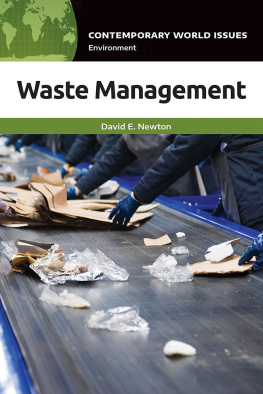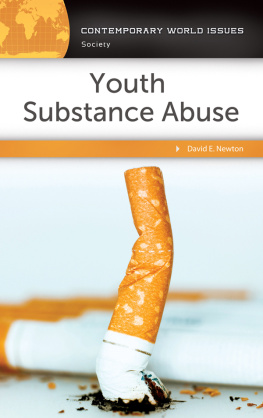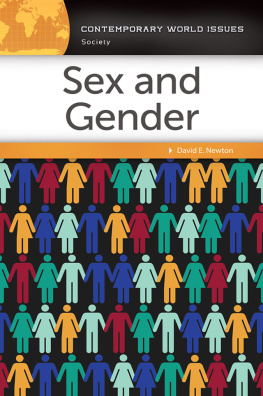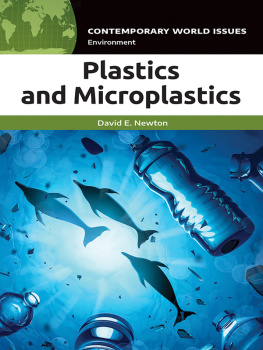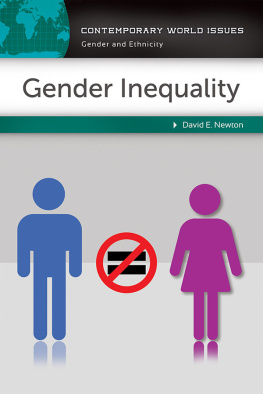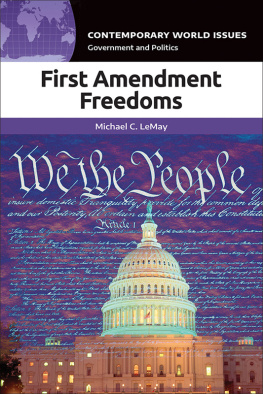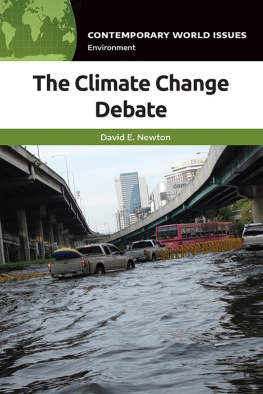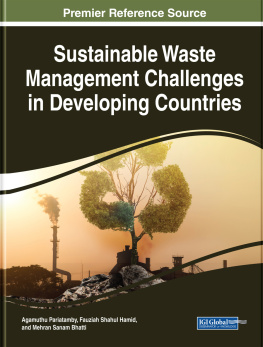Waste Management
Recent Titles in the
CONTEMPORARY WORLD ISSUES
Series
Transgender: A Reference Handbook
Aaron Devor and Ardel Haefele-Thomas
Eating Disorders in America: A Reference Handbook
David E. Newton
Natural Disasters: A Reference Handbook
David E. Newton
Immigration Reform: A Reference Handbook
Michael C. LeMay
Vegetarianism and Veganism: A Reference Handbook
David E. Newton
The American Congress: A Reference Handbook
Sara L. Hagedorn and Michael C. LeMay
Disability: A Reference Handbook
Michael Rembis
Gender Inequality: A Reference Handbook
David E. Newton
Media, Journalism, and Fake News: A Reference Handbook
Amy M. Damico
Birth Control: A Reference Handbook
David E. Newton
Bullying: A Reference Handbook
Jessie Klein
Domestic Violence and Abuse: A Reference Handbook
Laura L. Finley
Torture and Enhanced Interrogation: A Reference Handbook
Christina Ann-Marie DiEdoardo
Racism in America: A Reference Handbook
Steven L. Foy
Books in the Contemporary World Issues series address vital issues in todays society such as genetic engineering, pollution, and biodiversity. Written by professional writers, scholars, and nonacademic experts, these books are authoritative, clearly written, up-to-date, and objective. They provide a good starting point for research by high school and college students, scholars, and general readers as well as by legislators, businesspeople, activists, and others.
Each book, carefully organized and easy to use, contains an overview of the subject, a detailed chronology, biographical sketches, facts and data and/or documents and other primary source material, a forum of authoritative perspective essays, annotated lists of print and nonprint resources, and an index.
Readers of books in the Contemporary World Issues series will find the information they need in order to have a better understanding of the social, political, environmental, and economic issues facing the world today.
CONTEMPORARY WORLD ISSUES
Waste Management
A REFERENCE HANDBOOK
David E. Newton

Copyright 2020 by ABC-CLIO, LLC
All rights reserved. No part of this publication may be reproduced, stored in a retrieval system, or transmitted, in any form or by any means, electronic, mechanical, photocopying, recording, or otherwise, except for the inclusion of brief quotations in a review, without prior permission in writing from the publisher.
Library of Congress Cataloging-in-Publication Data
Names: Newton, David E., author.
Title: Waste management : a reference handbook / David E. Newton.
Description: Santa Barbara, California : ABC-CLIO, [2020] | Series: Contemporary world issues | Includes bibliographical references and index.
Identifiers: LCCN 2020012939 (print) | LCCN 2020012940 (ebook) | ISBN 9781440872822 (hardcover) | ISBN 9781440872839 (ebook)
Subjects: LCSH: Refuse disposal industry. | Refuse and refuse disposal. | Integrated solid waste management.
Classification: LCC HD9975.A2 N49 2020 (print) | LCC HD9975.A2 (ebook) | DDC 338.4/762844dc23
LC record available at https://lccn.loc.gov/2020012939
LC ebook record available at https://lccn.loc.gov/2020012940
ISBN: 978-1-4408-7282-2 (print)
978-1-4408-7283-9 (ebook)
24 23 22 21 201 2 3 4 5
This book is also available as an eBook.
ABC-CLIO
An Imprint of ABC-CLIO, LLC
ABC-CLIO, LLC
147 Castilian Drive
Santa Barbara, California 93117
www.abc-clio.com
This book is printed on acid-free paper 
Manufactured in the United States of America
Contents
Hussain Ather
Sandy Becker
Adrienne Fung
Joel Grossman
Jim Nordlinger
Lisa Perschke
Nidia K. Trejo
Lynn Zender
Geena Zick
Americans threw away about 34.5 million tons of plastic in 2015 (the last year for which data are available). Just under 10 percent of that waste was recycled. Another 15 percent was incinerated. The remaining 75 percentan estimated 26.2 million tonswas deposited in dumps and landfills. Those plastic wastes will remain unchanged in the dumps and landfills for generations, hundreds of years, or even longer.
The U.S. nuclear power industry has accumulated nearly 80,000 metric tons of wastes since the first power plant was built in 1958. According to the best present estimates, the industry will continue to generate at least 2,200 tons of high-level radioactive waste per year for the foreseeable future. At the present time, all that waste is stored at seventy-five reactor sites in thirty-three states where it was eventually produced. No single national storage site where wastes can be safely held for hundreds of thousands of years has yet been developed. No such site is even on the drawing boards.
What do these two snippets have to say about the waste management problem in the United States today? As different in size and scope as the examples are, they both say essentially the same thing: Americans are producing huge amounts of household waste and too much hazardous nuclear waste. And no adequate system for dealing with either of these issues has yet been developed. Thus, in a world where climate change, threats to democratic systems, widespread poverty, serious health problems, and similar issues are at the forefront of peoples minds, wastes are probably mostly a second thought.
But for those individuals and companies actually involved in the waste management industry, those problems are certainly not insignificant; in fact, they pose a daunting challenge for communities, businesses, specialized fields of waste management, and yes, even individual people. The most basic question of all is this: How are those wastes supposed to be disposed of? For many centuries, the answer to that question has been some version of throw them out the window, dump them in an empty field, toss them in the nearest river, or some variation of these themes. Even today, untold numbers of open dumps remain as the main source of waste disposal in the world, and some thousands still remain in the United States. A more developed form of disposalthe sanitary landfillhas now become the disposal system of choice in the United States, with about 2,200 such sites open for business. The bottom line, however, is that landfills are no longer an adequate tool for disposing the huge amounts of solid wastes our society produces, not by a long shot.
Discussions about waste management now appear to be going in the direction of a concept known as integrated solid waste management (ISWM). Within that concept, all aspects of waste managementgeneration, transportation, storage, recycling, landfills, incineration, and compostingare considered parts of a single system. Not one of these steps occurs without consideration of the way it interacts with the other steps in the process. A detailed discussion of this way of thinking about wastes is the core approach of this book. In addition to learning about the history of waste management and its current status, the book also reviews some current problems in the field, such as exportation of hazardous and plastic wastes; the status and future of plastic wastes, nuclear wastes, electronic wastes, industrial wastes, agricultural wastes, and mining wastes; and environmental justice.

